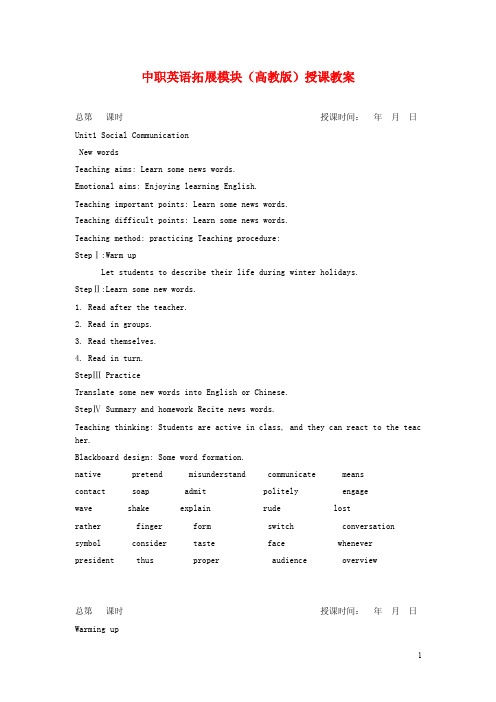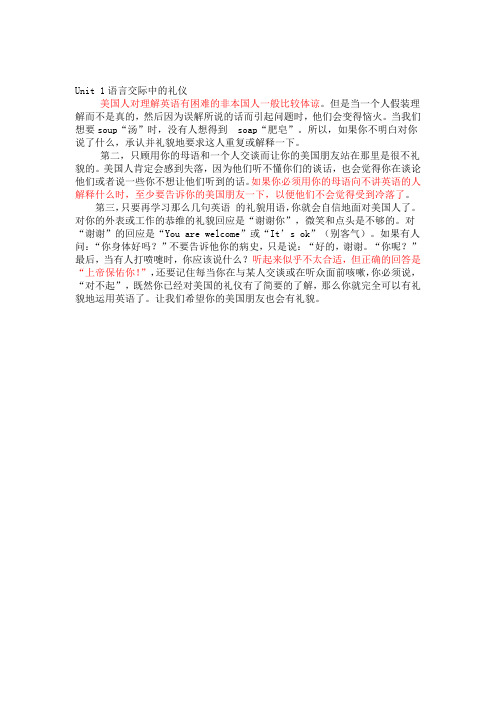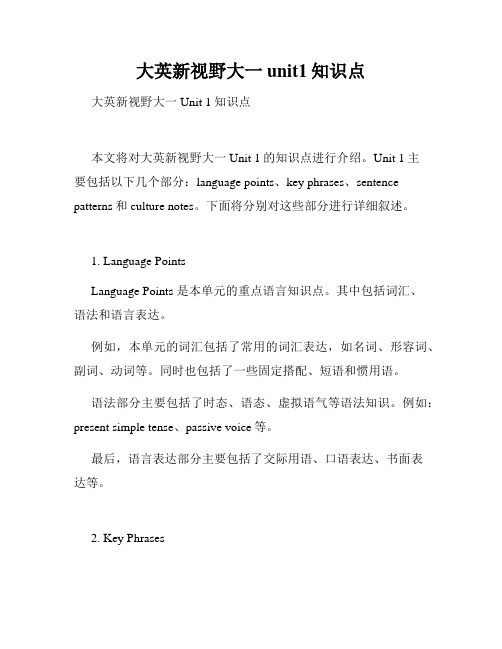Unit1 Etiquette in Language Communication 拓展 精讲
新编实用英语综合教程2 -Unit 1 Invitation Etiquette教案

Unit 1 Invitation EtiquetteUnit GoalsWhat you should learn to doMake an oral invitation to:Invite people to join daily activitiesInvite people to formal occasionsMake a written invitation(write an invitation card or a letter) for:Personal invitationOfficial occasionsGive a reply to:An oral invitationA written invitationWhat you should know aboutInvitation culture:western and ChineseWord order in a subordinate clauseRequirements:After learning this unit, students should grasp:1.Read and understand the meaning of invitation cards and letters2.How to write invitation cards and letters and remember the patterns of invitation cards and letters3.How to invite people to party or dinner,and how to accept and decline invitations4.The customs of inviting people in different countries5.Important words,phrases and language points in the passageIn our daily life,we need to invite others to dinner or take part in all kinds of parties, so we should know about western custom about invitation.Foreign custom is much stricter than Chinese custom in the matter of replying toinvitations。
2016中职英语拓展模块(高教版)授课教案:Unit1SocialCommunication

中职英语拓展模块(高教版)授课教案总第课时授课时间:年月日Unit1 Social CommunicationNew wordsTeaching aims: Learn some news words.Emotional aims: Enjoying learning English.Teaching important points: Learn some news words.Teaching difficult points: Learn some news words.Teaching method: practicing Teaching procedure:StepⅠ:Warm upLet students to describe their life during winter holidays.StepⅡ:Learn some new words.1. Read after the teacher.2. Read in groups.3. Read themselves.4. Read in turn.StepⅢ PracticeTranslate some new words into English or Chinese.StepⅣ Summary and homework Recite news words.Teaching thinking: Students are active in class, and they can react to the teac her.Blackboard design: Some word formation.native pretend misunderstand communicate meanscontact soap admit politely engagewave shake explain rude lostrather finger form switch conversation symbol consider taste face whenever president thus proper audience overview总第课时授课时间:年月日Warming upTeaching aims: Learn some news words.Emotional aims: Learn some manners in language communication.Teaching important points: Discuss some questions.Teaching difficult points: Learn some news words.Teaching method: practicing and discussing.Teaching procedure: StepⅠRevisionReview some words.StepⅡ Discussion 讨论课文插图Now look at the picture in the reading text "Etiquette in Language Communic ation".What can you see in it?-From the picture, we can see a woman is talking with a man. But the manlooks a bit uneasy, maybe he is nervous. Obviously it's not a smooth language c ommunication.StepⅢ提示相关生词和短语,如:native speaker, native language, have trouble in doing sth, pretend to do sth, repeat, explain, manner等。
2023外研版英语必修一unit1 using language教案

2023外研版英语必修一unit1 using language教案
一、教学目标:
1. 学生能够理解和使用单元主题相关的词汇和表达方式。
2. 学生能够掌握本单元中使用的语法结构和句式。
3. 学生能够运用所学知识进行口头和书面表达,提高英语综合能力。
二、教学内容:
本单元的Using Language部分包括一篇阅读文章和相应的练习。
阅读文章主要讲述了一位学生在学校图书馆发现了一本神奇的书,通过这本书,他获得了许多有趣的知识和技能。
文章中涉及到的语法结构和词汇都比较丰富,学生可以通过阅读和练习来巩固所学知识。
三、教学步骤:
1. 导入:首先,通过简单的对话或问题引入本单元的主题和阅读文章的内容。
2. 词汇学习:讲解文章中出现的生词和短语,帮助学生理解和记忆。
可以通过图片、视频、例句等方式进行展示和讲解。
3. 阅读理解:让学生阅读文章,并回答提前准备的一些问题,检查学生对文章的理解程度。
4. 语法结构学习:讲解文章中使用的语法结构和句式,可以通过例句、练习等方式进行巩固和练习。
5. 练习完成:让学生完成一些与文章相关的练习题,如填空、选择、改写句子等,以检验学生的学习成果。
6. 总结回顾:最后,回顾本节课所学的内容和重点,鼓励学生运用所学知识进行口头和书面表达。
四、教学反思:
课后,教师需要对本节课的教学情况进行反思,找出不足和需要改进的地方,以提高教学效果。
以上就是《2023外研版英语必修一unit1 using language教案》的教学思路,希望能对您有所帮助。
Unit 1 Etiquette in Language communication译文

Unit 1语言交际中的礼仪
美国人对理解英语有困难的非本国人一般比较体谅。
但是当一个人假装理解而不是真的,然后因为误解所说的话而引起问题时,他们会变得恼火。
当我们想要soup“汤”时,没有人想得到soap“肥皂”。
所以,如果你不明白对你说了什么,承认并礼貌地要求这人重复或解释一下。
第二,只顾用你的母语和一个人交谈而让你的美国朋友站在那里是很不礼貌的。
美国人肯定会感到失落,因为他们听不懂你们的谈话,也会觉得你在谈论他们或者说一些你不想让他们听到的话。
如果你必须用你的母语向不讲英语的人解释什么时,至少要告诉你的美国朋友一下,以便他们不会觉得受到冷落了。
第三,只要再学习那么几句英语的礼貌用语,你就会自信地面对美国人了。
对你的外表或工作的恭维的礼貌回应是“谢谢你”,微笑和点头是不够的。
对“谢谢”的回应是“You are welcome”或“It’s ok”(别客气)。
如果有人问:“你身体好吗?”不要告诉他你的病史,只是说:“好的,谢谢。
“你呢?”最后,当有人打喷嚏时,你应该说什么?听起来似乎不太合适,但正确的回答是“上帝保佑你!”,还要记住每当你在与某人交谈或在听众面前咳嗽,你必须说,“对不起”,既然你已经对美国的礼仪有了简要的了解,那么你就完全可以有礼貌地运用英语了。
让我们希望你的美国朋友也会有礼貌。
大英新视野大一unit1知识点

大英新视野大一unit1知识点大英新视野大一Unit 1知识点本文将对大英新视野大一Unit 1的知识点进行介绍。
Unit 1主要包括以下几个部分:language points、key phrases、sentence patterns和culture notes。
下面将分别对这些部分进行详细叙述。
1. Language PointsLanguage Points 是本单元的重点语言知识点。
其中包括词汇、语法和语言表达。
例如,本单元的词汇包括了常用的词汇表达,如名词、形容词、副词、动词等。
同时也包括了一些固定搭配、短语和惯用语。
语法部分主要包括了时态、语态、虚拟语气等语法知识。
例如:present simple tense、passive voice等。
最后,语言表达部分主要包括了交际用语、口语表达、书面表达等。
2. Key PhrasesKey Phrases 是本单元的重点短语。
通过掌握这些短语,能更好地理解和应用在实际生活或者学习当中。
例如:in addition、as a result、on the other hand等常用的关键短语。
3. Sentence PatternsSentence Patterns 是本单元的重点句型。
这些句型可以帮助学生提高语言表达的能力。
例如:It is + adj. + to do sth.、Not only...but also...等句型。
4. Culture NotesCulture Notes 是本单元的文化知识点。
通过了解和学习这些文化知识,可以更好地了解和理解英语国家的文化背景。
例如:英语国家的传统节日、习俗等。
在学习大英新视野大一Unit 1知识点时,可以通过阅读教材中的相关内容,积极参与课堂讨论和活动,或者通过参考外部资源进行拓展学习。
同时,可以结合练习题和模拟考试来检验自己的学习效果,及时总结和反思,提高英语学习的能力。
总结起来,大英新视野大一Unit 1知识点包括Language Points、Key Phrases、Sentence Patterns和Culture Notes。
外研版高一必修一module1知识点

外研版高一必修一module1知识点外研版高一必修一Module 1 知识点Module 1 知识点概述:Module 1 是高中英语必修一课程的第一个模块,主要介绍了关于国际友谊和文化差异的知识点。
通过学习本模块的内容,我们可以了解不同国家的文化特点,培养跨文化交流的能力,拓宽我们的国际视野。
一、国家与国家之间的友谊与合作1. 国内外友好交流:在国际交往中,重视友好交流对于不同国家之间的合作非常重要。
友好交流可以促进国与国之间的互信,增进了解,推动合作,共同发展。
2. 国际组织与合作:国际组织是促进国与国之间友好合作的重要机构。
比如联合国、世界贸易组织等国际组织,它们的目标是维护国际和平与安全,促进各国合作与发展。
二、文化差异与文化交流1. 文化差异的认识:不同国家的文化差异体现在语言、思维方式、宗教信仰、习俗礼仪等方面。
了解文化差异有助于我们更好地进行国际交流与合作。
2. 跨文化交际的重要性:跨文化交际是指跨越语言和文化差异进行有效交流的能力。
跨文化交际能够促进国际友谊,增进彼此理解,有效解决合作中出现的问题。
三、节日与礼仪1. 各国传统节日:不同国家有各种各样的传统节日,比如中国的春节,美国的感恩节,英国的复活节等。
了解各国传统节日有助于增进我们对其他文化的了解。
2. 各国礼仪习俗:礼仪是指特定社会和文化环境下的行为规范。
不同国家的礼仪习俗各有不同,比如中国的鞠躬礼,美国的握手问候等。
了解各国礼仪习俗可以避免文化冲突,增进互相尊重。
四、国际交往技巧1. 跨文化沟通技巧:跨文化沟通需要注意语言表达的准确性和文化敏感度。
避免使用太多的俚语和隐喻,尊重对方的文化习俗和价值观。
2. 解决文化冲突的能力:在国际交往中,不同的文化可能会产生冲突。
解决文化冲突需要双方的宽容和理解,以及寻找双赢的解决方案。
总结:Module 1 的内容主要涉及国际友谊、文化差异和跨文化交际等知识点。
通过学习这些知识点,我们可以更好地理解不同的文化背景,培养国际交往能力,推动国家间的友好合作。
unit1etiquette in language communication

7. Whenever 无论何时(引导让步状语从句) Eg: You may come and get whenever you are free.
Homework
• Finish reading comprehension.
Homework
• Remember the useful words and phrases.
Eg: The young lady has trouble solving her family’s problems. We had no trouble communicating with each other.
Reading
3. pretend to do sth 假装做某事 Eg: I pretended to not see her in the park.
Reading
1.be tolerant of 宽容 Eg: Mothers are always tolerant of their children.
2.have trouble /difficulty doing sth做某事有困难 have no/some trouble doing sth
PPT模板下载:/moban/ 节日PPT模板:/jieri/ PPT背景图片:/beijing/ 优秀PPT下载:/xiazai/ Word教程: /word/ 资料下载:/ziliao/ 范文下载:/fanwen/ 教案下载:/jiaoan/ 字体下载:/ziti/
The boy pretended to be reading book ,when the teacher came to see him .
4. ask for 要求 Eg: We ask parents for money every week.
EtiqEtiquette in language communication1语言交流中的礼仪

1)Let students read the words by themselves .
2)Listen to the tape to correct their wrongpronunciation.
3)Read the words carefully again .
( ) 2.explain Aexample Bexit Cexcuse Dexpert
( ) 3. rude A suggest B jump C include Duseful
( ) 4. leave A bread B break C areaD mean
( ) 5. rather Athank B gather Cthick Dthink
Step4. Practice in class
Get the Ss to finish the Exx by themselves.
1.Do some exercises about the pronunciation
( ) 1. taste A rather B handshake C facial Dadmit
4)Ask the students to read after the tape .
5)Ask the students to read one by one and ask them to pay attention to the following words:
native speakeretiquettetolerant be tolerant of annoy be annoyed with pretend misunderstand ask for politely explain lost switch switch on /switch off leave out whenever audience overview
- 1、下载文档前请自行甄别文档内容的完整性,平台不提供额外的编辑、内容补充、找答案等附加服务。
- 2、"仅部分预览"的文档,不可在线预览部分如存在完整性等问题,可反馈申请退款(可完整预览的文档不适用该条件!)。
- 3、如文档侵犯您的权益,请联系客服反馈,我们会尽快为您处理(人工客服工作时间:9:00-18:30)。
• so that为了,以便 • I gave you a map so that you wouldn't get lost. • 我怕你迷路,给过你一张地图。 • She worked hard so that everything should be ready in time. • 她努力工作,为的是及时做好各项准备 。
• leave out忽视、忽略、遗忘 • She left out a "c" in "account" . • 她在"account"这个词中漏掉了一个"c" 。 • 我们不应该遗忘历史。 • We should not leave out the historபைடு நூலகம்.
• be ready to do 准备做... • You should be ready to face your life by yourself. • 你应该做好自己面对人生的准备 • 你准备好出去了吗? • Are you ready to go out?
• switch to转向 • They switched the talk to a more interesting subject. • 他们把谈话转到比较有趣的话题上去了 。 • 他原来学数学,后来改学英语。 • He studied Math and then switched to English.
• at least至少 • It will cost at least 500 dollars. • 这个东西至少要花500美元。 • She must be at least 40。 • 她至少应该有40岁了。 • 人们每天应该喝至少八杯水。 • People should drink at least 8 cups of water every day.
• in the middle of在...中间 • She came in the middle of the day. • 她在中午的时候来了。 • 她坐在教室中间。 • She sits in the middle of the classroom.
• now that既然 • You should have a good rest now that you've finished the work. • 既然已完成了工作,你就应该好好 休息一下。
Etiquette in Language Communication
• • • • •
be tolerant of对...宽容,体谅 She was tolerant of different views. 她容忍不同的意见。 我们应该学会宽容他人。 You should learn to be tolerant of others. • have trouble (in) doing sth. 在做某事上有麻烦 • He has trouble in learning English. • 他在学英语方面有麻烦。
• pretend to do sth.假装做... • She didn't love to drink wine,though she pretended to. • 她并不喜欢喝酒,虽然她装出喜欢 喝的样子。 • 他假装没看见。 • He pretended not to see.
• ask (sb.) for sth.要求(某物) • She asked for a glass of iced tea instead of beer. • 她要了一杯冰茶而不是啤酒。 • Can I ask you for help? • 能请你帮个忙吗?
